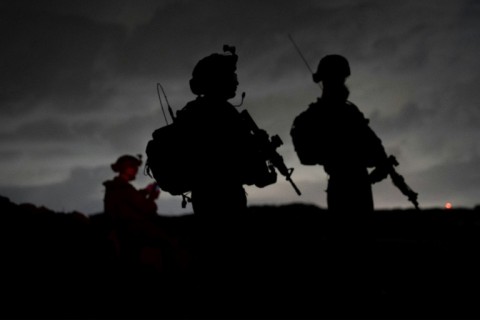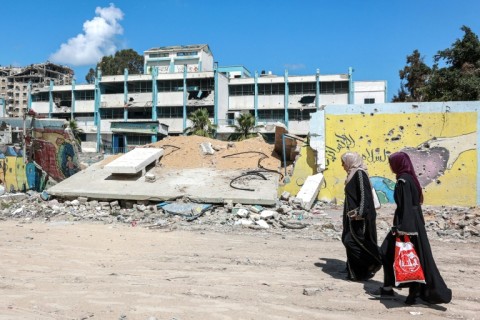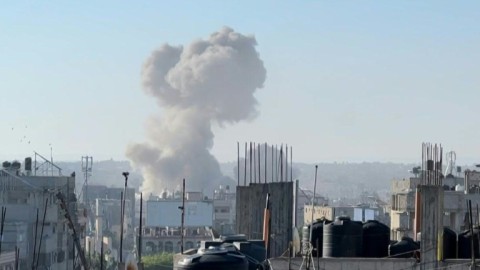RAFAH - Israel shelled Rafah on Thursday as US President Joe Biden offered his starkest warning yet over the conduct of its war against Hamas, vowing to cut off arms transfers if an offensive into the southern Gaza city goes ahead.
Israel has already defied international objections by sending in tanks and conducting "targeted raids" in the border city, which it says is home to Hamas's last remaining battalions -- but is also crowded with displaced Palestinian civilians.
AFP journalists reported heavy shelling in Rafah early Thursday, and the Israeli military later said it was also striking "Hamas positions" further north in the centre of the Gaza Strip.
In an interview with CNN on Wednesday, Biden warned he would stop US weapons supplies to Israel if it pushed ahead with its long-threatened Rafah ground offensive.
Israel on Thursday called the threat "very disappointing."
Biden told CNN that, "If they go into Rafah, I'm not supplying the weapons that have been used... to deal with the cities." He added: "We're not gonna supply the weapons and the artillery shells that have been used."
Israel early Tuesday seized Rafah's border crossing into Egypt, which has served as the main entry point for aid into besieged Gaza.
The White House condemned the interruption to humanitarian deliveries at the time, and the secretary of defence later confirmed Washington had paused a shipment of heavy bombs to Israel after it failed to address concerns over its Rafah ground incursion.
"Civilians have been killed in Gaza as a consequence of those bombs," Biden said in his interview. "It's just wrong."
He insisted, however, that the United States, Israel's staunchest ally, was "not walking away from Israel's security".

In Israel's first reaction to Biden's threat, its ambassador to the United Nations, Gilad Erdan, called it "a difficult and very disappointing statement to hear from a president to whom we have been grateful since the beginning of the war."
The United States, along with Egypt and Cairo, has been heavily involved in talks currently under way in Cairo aimed at brokering a ceasefire in the seven-month war.
- 'Extreme fear' -
The Israeli military said Wednesday it was reopening another major aid crossing into Gaza, Kerem Shalom, as well as the Erez crossing.
But the United Nations agency for Palestinian refugees, UNRWA, said the Kerem Shalom crossing -- which Israel shut after a rocket attack killed four soldiers on Sunday -- remained closed.
Late Wednesday, the army said a soldier was lightly wounded when the Kerem Shalom area was again targeted by rockets.

The heavy shelling in Rafah overnight into Thursday followed a day of what the Israeli military said were "targeted raids on the Gazan side of Rafah crossing", in the city's east.
Civilian life in Rafah "has completely ceased", said displaced Gazan Marwan al-Masri, 35, noting "the streets are empty" in the western part of the city.
"We are living in Rafah in extreme fear and endless anxiety," said Muhanad Ahmad Qishta, 29.
"Places the Israeli army claims to be safe are also being bombed," he told AFP.
- 'Catastrophic' health situation -
An emergency doctor working in Rafah and nearby Khan Yunis said that with humanitarian access compromised, the health situation was "catastrophic".
"The smell of sewage is rife everywhere," said the doctor, James Smith. "It's been getting worse over the course of the last couple of days."
World Health Organization chief Tedros Adhanom Ghebreyesus said Wednesday that hospitals in southern Gaza had only "three days of fuel left" because of the border closures.
"Without fuel all humanitarian operations will stop."
The war in Gaza was sparked by Hamas's unprecedented October 7 attack on Israel, which resulted in the deaths of more than 1,170 people, mostly civilians, according to an AFP tally of Israeli official figures.
Israel in response vowed to crush Hamas and launched a military offensive that has killed at least 34,844 people in Gaza, mostly women and children, according to the Hamas-run territory's health ministry.
Militants also took about 250 hostages. Israel estimates 128 of them remain in Gaza, including 36 who officials say are dead.
- Truce talks -
Talks involving Qatari, US and Hamas delegations aimed at cementing a long-stalled ceasefire deal would continue Thursday in Cairo, said Al-Qahera News, which is linked to Egyptian intelligence.
It added, citing an informed source, that Islamic Jihad, which is fighting alongside Hamas, and the Marxist Popular Front for the Liberation of Palestine, were also participating and "are open" to reaching a deal.
Al-Qahera added that efforts were underway to "iron out points of contention in the negotiations."
A senior Hamas official said the latest round of negotiations would be "decisive".
Hamas "insists on the rightful demands of its people", the official said on condition of anonymity because he was not authorised to speak publicly about the negotiations.

The Hamas official had previously warned the Cairo talks would be Israel's "last chance" to free the hostages still in militants' hands.
Mediator Qatar also appealed "for urgent international action to prevent Rafah from being invaded and a crime of genocide being committed".
Palestinian analyst Mkhaimar Abusada said Israel's seizure of the Rafah crossing could be an attempt to create new facts on the ground, or a bid to "sabotage the truce talks".
Netanyahu has described the Rafah operation as "a very important step" in denying Hamas "a passage that was essential for establishing its reign of terror".
AFP

